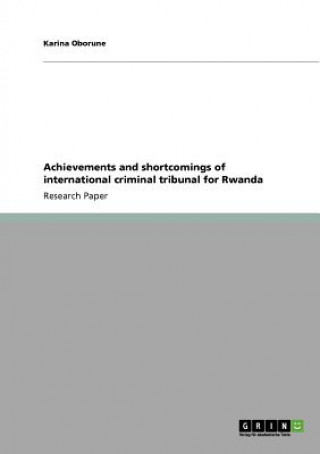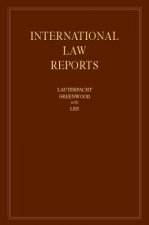
Kód: 01638876
Achievements and shortcomings of international criminal tribunal for Rwanda
Autor Karina Oborune
Research Paper from the year 2009 in the subject Politics - International Politics - Topic: Peace and Conflict Studies, Security, printed single-sided, grade: A-, University of Basel (Europainstitut), course: Friedensförderungssem ... celý popis
- Jazyk:
 Angličtina
Angličtina - Vazba: Brožovaná
- Počet stran: 56
Nakladatelství: Grin Publishing, 2010
- Více informací o knize

Mohlo by se vám také líbit
-

International Law Reports
5775 Kč -

Kleidung und Identitat
1671 Kč -

Herr Adamson
259 Kč -

Der Babylonische Talmud, 12 Bde.
7382 Kč -

Vergnugungen Der Angelsachsen
1022 Kč
Dárkový poukaz: Radost zaručena
- Darujte poukaz v libovolné hodnotě a my se postaráme o zbytek.
- Poukaz se vztahuje na celou naši nabídku.
- Elektronický poukaz vytisknete z e-mailu a můžete ihned darovat.
- Platnost poukazu je 12 měsíců od data vystavení.
Více informací o knize Achievements and shortcomings of international criminal tribunal for Rwanda
Nákupem získáte 102 bodů
 Anotace knihy
Anotace knihy
Research Paper from the year 2009 in the subject Politics - International Politics - Topic: Peace and Conflict Studies, Security, printed single-sided, grade: A-, University of Basel (Europainstitut), course: Friedensförderungsseminar, language: English, abstract: ABSTRACT§Aim of paper§This paper deals with the effectiveness and achievements of ICTR that can be viewed in light of aims set out in the UN Resolution 955, 1994. In the Resolution UN is determined to: 1) have effective application and enforcement of restrictions against the warfare perpetrators; 2) bring justice and ensure that violations are halted; 3) have fair trials; 4) contribute to criminal justice and process of reconciliation and restoration and maintenance of peace.§Hypotheses§In the present paper author put forward two hypotheses. The first hypothesis is that creation of ICTR was a logical, but moderate step, which would have not been necessary if global society would have appropriately reacted to previous warnings about possible genocide in Rwanda. The second hypothesis is that ICTR was merely a vehicle of justice, but it is hardly designed as a vehicle for reconciliation.§Analytical framework§Author has discussed the work of ICTR and refer to particular aims, possibility of their achievement and assess outcomes. Author used three tools of analytical framework: legal, political and economical, as from these different standing points it is possible to assess the work of ICTR in its entirety. Legal aspects of work of ICTR extend from mere procedural points to ICTR s contribution to legal tradition and legal developments. Author depicted which of legal aspects have undermined the authority and image of ICTR, as well as could be deemed as actual shortcomings, and how these aspects influence achievement of justice as the ultimate goal of legal authority. Financial aspect shows the costs of ICTR, but political aspect deals with assessment of set goals in the Resolution and bringing justice as a prerogative, as it is expected to be effective and appropriate.§Main conclusions§The paper shows that while making a significant contribution to the law of genocide and international criminal justice and establishing historical record (achievements), ICTR was incapable in reconciliation of witnesses and survivors and was described as job creation for foreigners (shortcomings).
 Parametry knihy
Parametry knihy
Zařazení knihy Knihy v angličtině Society & social sciences Politics & government
1022 Kč
- Plný název: Achievements and shortcomings of international criminal tribunal for Rwanda
- Autor: Karina Oborune
- Jazyk:
 Angličtina
Angličtina - Vazba: Brožovaná
- Počet stran: 56
- EAN: 9783640762316
- ISBN: 3640762312
- ID: 01638876
- Nakladatelství: Grin Publishing
- Hmotnost: 86 g
- Rozměry: 210 × 148 × 3 mm
- Datum vydání: 28. November 2010
Oblíbené z jiného soudku
-

Case Against the Sexual Revolution
410 Kč -

Wretched of the Earth
302 Kč -

The Trigger
602 Kč -

State and Revolution
116 Kč -

Accidental Superpower
454 Kč -

My Autobiography
322 Kč -

Fight Like A Girl
276 Kč -

Against Civilization
406 Kč -

Abaddon Ascending: The Ancient Conspiracy at the Center of CERN's Most Secretive Mission
681 Kč -

The Lords of Poverty: The Power, Prestige, and Corruption of the International Aid Business
341 Kč -

Politics
1301 Kč -

Cold and the Dark
482 Kč -

Voices from the Contemporary Japanese Feminist Movement
1387 Kč -

Calculus of Consent
410 Kč -

Mafia Monograph, Part 1 of 4
521 Kč -

Harm Reduction or Harm Maintenance
798 Kč -

Israel Lobby and U. S. Foreign Policy
931 Kč -

Entropy Of Capitalism
1118 Kč -

Red Petrograd
482 Kč -

Troubled Constitutional Future
708 Kč -

Lineages of Modernity - A History of Humanity from the Stone Age to Homo Americanus
1124 Kč -

Inventing Vietnam
1022 Kč -

City of Quartz
394 Kč -

Flash Boys - A Wall Street Revolt
272 Kč -

Lee Kuan Yew
538 Kč -

Giants
580 Kč -

Children of the Matrix
454 Kč -

Queer Encounters with Communist Power
552 Kč -

Identity
302 Kč -

Deep State
400 Kč -

Next Decade
436 Kč -

Return of Marco Polo's World
433 Kč -

Force of Reason
580 Kč -

STRANGE DEATH OF EUROPE
500 Kč -

Political Science For Dummies
471 Kč -

Yoga of Eating
358 Kč -

Political Brain
383 Kč -

GREEN BOOK
195 Kč -

Politics: A Very Short Introduction
249 Kč -

Out of the Wreckage
454 Kč -

No Turning Back
302 Kč -

Urban Warfare in the Twenty-First Century
675 Kč -

Trade Marketing, Category Management, and Shopper Marketing
2211 Kč -

Spirit of the Laws
621 Kč -

USAF Military Working Dog Program - Scholar's Choice Edition
742 Kč -

Psychology of Politics
563 Kč -

Report From Iron Mountain
373 Kč -

Lies My Teacher Told Me
561 Kč -

Liberalism and Its Critics
854 Kč
Osobní odběr Praha, Brno a 12903 dalších
Copyright ©2008-24 nejlevnejsi-knihy.cz Všechna práva vyhrazenaSoukromíCookies



 Vrácení do měsíce
Vrácení do měsíce 571 999 099 (8-15.30h)
571 999 099 (8-15.30h)